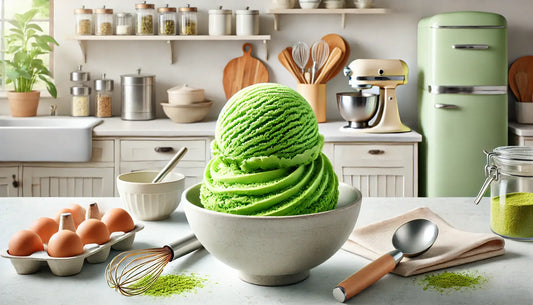Replacing coffee with green tea can be one of the best decisions you ever make, but there are a few things you’ll want to know first 🍵 🙌
In this article, we are going to be covering the benefits of switching from coffee to green tea as well as the challenges you might face by replacing your morning coffee with green tea.
Finally, we are going to cover 3 great teas that may help you if you are switching from coffee to green tea.
Let’s get started! 👇
Replacing coffee with green tea - what you need to know

Are you interested in replacing coffee with green tea?
While this can be a great decision, it is difficult for some people. Fear not!
We are going to help you out in this article.
We are going to start by covering the benefits of replacing coffee with green tea to give you a goal to shoot for.
Then we are going to be covering some of the best teas to start with if you are replacing coffee with green tea and what obstacles to look out for.
Benefits of replacing coffee with green tea

So is green tea better than coffee? Yes! 🍵🆚☕️
So let’s go through a few of the benefits of replacing coffee with green tea.
These benefits mostly have to do with the compounds that exist in the tea leaf that aren’t found in the coffee bean.
There are more benefits of green tea than we will have time to cover in this article, but if you want to learn more, you should definitely read this article here 👉 Green Tea Benefits and Why You Should Drink it Everyday
Rich in Antioxidants
One of the benefits of replacing coffee with green tea has to do with the antioxidants. Green tea is rich in antioxidants, particularly catechins, while coffee contains very little.
These antioxidants have been linked to various health benefits, including improved heart health, reduced oxidative stress, and potential protection against certain diseases.
Calming Amino Acid (L-theanine)
Green tea contains the amino acid L-theanine, which has calming and relaxing properties. The combination of caffeine and L-theanine in green tea can provide alertness without the same jittery feelings associated with coffee.
Improved Hydration
Green tea contributes to daily fluid intake and can be a hydrating option. Unlike coffee, which can have a diuretic effect, green tea is less likely to contribute to dehydration.
Reduced Jitters and Anxiety
The lower caffeine content in green tea may lead to a milder stimulating effect, potentially reducing feelings of jitteriness or anxiety associated with higher caffeine doses found in coffee.
Potential Cardiovascular Benefits
Some studies suggest that green tea may have cardiovascular benefits, including potential improvements in cholesterol levels and blood pressure. These benefits can contribute to heart health and they come mostly from the catechins in the tea leaf.
These catechins alone can be one of the major benefits of switching from coffee to green tea.
Dental Health
Another one of the benefits of replacing coffee with green tea has to do with oral health. It contains compounds that can help inhibit the growth of bacteria in the mouth, potentially contributing to improved oral hygiene.
Green tea is also not believed to stain teeth like coffee can, making it easier on the teeth overall. There is actually a fascinating article on this, and if you want to read it you can find it here 👉 Does Matcha Stain Teeth? Here’s What to do About it
Teas to help when switching from coffee to green tea
When you’re switching from coffee to green tea, there are a few things that can help. We’re going to take a look at our 3 favorites green teas to recommend to people that are replacing coffee with green tea.
Gyokuro

By replacing coffee with green tea, one of the most difficult things can be giving up the caffeine.
Luckily, gyokuro has even more caffeine than coffee!
This is a long shaded green tea with a sweet and savory flavor and 120-140mg of caffeine per serving.
The tea is also high in theanine, so you may not get the same crash or jitters you normally associate with coffee.
If you want to learn more about high caffeine green teas like this, we have the perfect guide for you 👉 What is the Gyokuro Caffeine level?
Matcha

When it comes to replacing coffee with green tea, matcha powder is one of the first things that comes to mind.
Like gyokuro, matcha is a shaded tea that is high in caffeine and theanine, with 68mg of caffeine in a single teaspoon.
When switching from coffee to green tea, one of the things people miss is the lattes.
If you are used to beginning your day with a latte, try using some matcha instead of coffee.
If you are mixing with milk and sugar, the latte grade matcha is the perfect option!
Hojicha

When switching from coffee to green tea, another thing you’ll notice is that the flavor profiles are completely different.
If you miss the earthy and roasted flavors of coffee, you might want to try hojicha.
This tea is roasted, which gives it a bolder and darker flavor profile that tastes similar to coffee.
You can still take advantage of the benefits of switching from coffee to green tea, because hojicha is very low in caffeine.
If you want to take a deep dive into the flavor profile of hojicha and learn to find the best one for you, we made the perfect article for you 👉 Hojicha Flavor: learn what does Hojicha taste like
Challenges of switching from coffee to green tea

So even though there are a lot of benefits of switching from coffee to green tea, there can be some challenges. Here are the things that people most commonly struggle with.
Taste
Both coffee and green tea taste very good, but the flavors are different. By replacing coffee with green tea, you are getting a drink that has a milder flavor and more of this citrusy of vegetal flavor compared to coffee.
It may take awhile for your taste buds to adapt, as coffee does have a much stronger flavor but overtime you will begin to appreciate the subtle nuances of green tea.
If you want to explore the taste profile of green tea, you might want to read this article 👉 What does matcha taste like? Taste Chart with Video
Caffeine
By replacing your morning coffee with green tea, you will most likely end up consuming less caffeine. While this is seen as one of the benefits of replacing coffee with green tea, it can take some getting used to.
As we mentioned in a previous section, there are a few green teas that can actually have a higher caffeine content than coffee, but you won’t feel this same jolt of energy. This is a good thing in the long term, as you’ll get a more balanced energy, but in the begin it may be hard to get used to.
If you want to learn more about how the caffeine content of green tea compares to coffee, we made a full guide all about it 👉 Does Green Tea Have Caffeine? We Reveal the Truth




